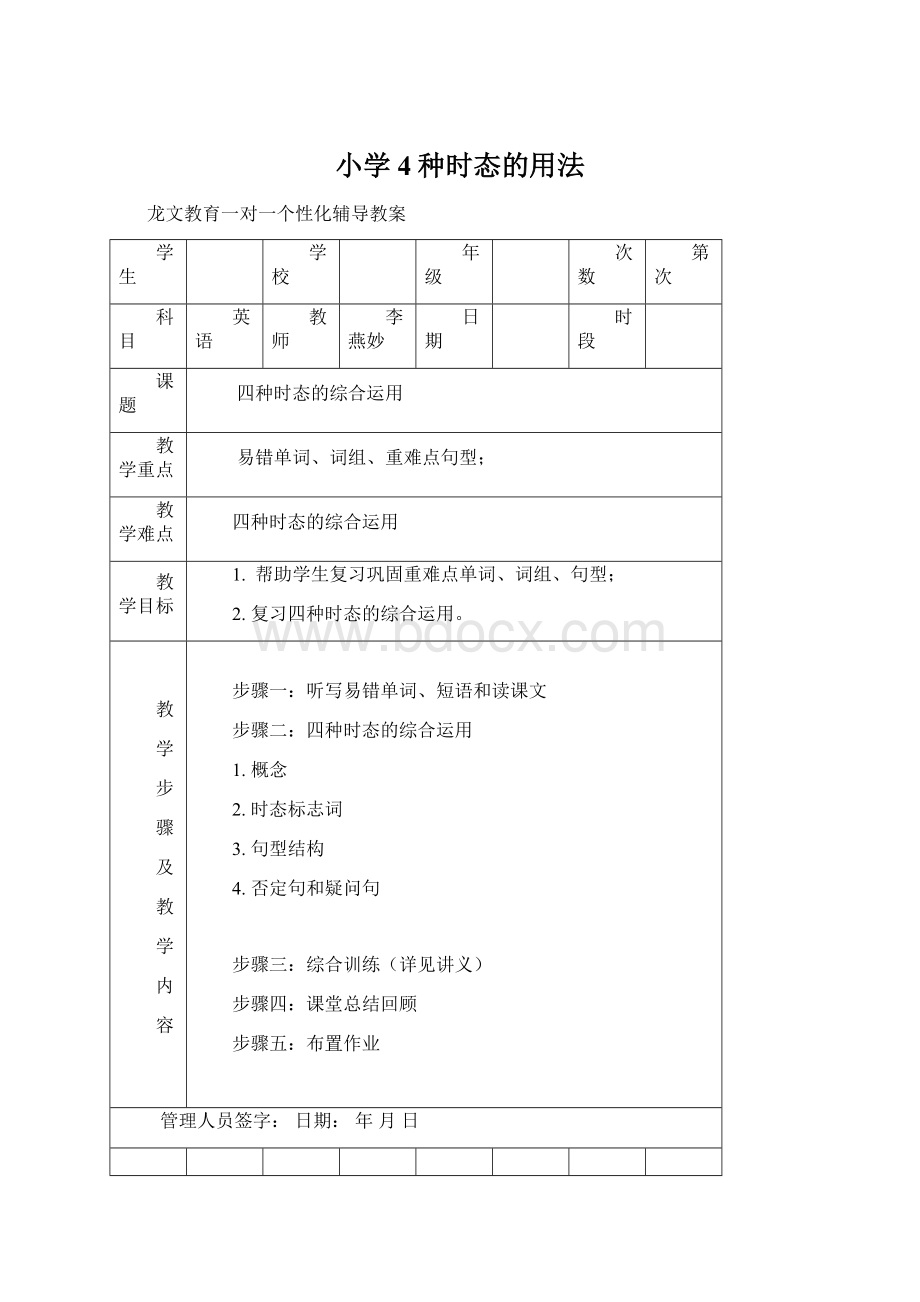小学4种时态的用法.docx
《小学4种时态的用法.docx》由会员分享,可在线阅读,更多相关《小学4种时态的用法.docx(13页珍藏版)》请在冰豆网上搜索。

小学4种时态的用法
龙文教育一对一个性化辅导教案
学生
学校
年级
次数
第次
科目
英语
教师
李燕妙
日期
时段
课题
四种时态的综合运用
教学重点
易错单词、词组、重难点句型;
教学难点
四种时态的综合运用
教学目标
1.帮助学生复习巩固重难点单词、词组、句型;
2.复习四种时态的综合运用。
教
学
步
骤
及
教
学
内
容
步骤一:
听写易错单词、短语和读课文
步骤二:
四种时态的综合运用
1.概念
2.时态标志词
3.句型结构
4.否定句和疑问句
步骤三:
综合训练(详见讲义)
步骤四:
课堂总结回顾
步骤五:
布置作业
管理人员签字:
日期:
年月日
作业布置
1、学生上次作业评价:
○好○较好○一般○差
备注:
2、本次课后作业:
课堂小结
家长签字:
日期:
年月日
时态综合复习
讲义
一、知识点讲解
时态
定义
标志词
谓语形式
疑问形式
否定式
提问
一般现在时
1.目前存在的状态
2.经常性、习惯性的动作
3.用于客观真理,客观存在,科学事实。
频度副词:
always,usually,often,sometimes,everyday(week….)
twiceaweek,seldom,
never.
系动词be(am,is,are)
行为动词原形(主语为第三人称单数时V+s,或es)
放主语前
2.主语前加do或does(动词还原)
+not
2.动词前加don’t或doesn’t(动词还原)
Whatdo/does+主语+do…
如:
ShereadsEnglisheveryday.
Whatdoesshedoeveryday
现在进行时
表示现在或当前一段时间正在进行的动作或存在的状态
1.提示语:
look!
Listen!
+时间点
3.当前一段时间thisweek,thesedays
themoment
Be(am,is,are)+V-ing
be放主语前
be+not
Whatis/are+主语+doing
如:
We’relisteningnow.
Whatareyoudoingnow
一般将来时
1.表示打算做某事
2.将要发生的动作或存在的状态
1.tomorrow,thedayaftertomorrow,soon,
thisafternoon,thisevening,thisweekend,
nextday,
nextweek(month,year…)
thefuture,twodayslater,aftertwodays,inafewdays.
goingto+V原形
+V原形
come,leave,start等用现在进行时表示将来时。
be或will放主语前
be或will后加not
willnot=won’t
is/are+…goingtodo…
will+主语+do…
如:
Hewillplaybasketballnextweek.
Whatwillhedonextweek
一般过去时
表示过去时间内发生的动作或存在的状态
1.yesterday/thedaybeforeyesterday,
lastweek/year/month等
2.twoyearsago/in2005/atthattime/inthepast
3.justnow
thatmoment
1.动词be的过去时(was,were)
2.行为动词的过去式
were放主语前
2.主语前加did(动词还原)
were+not
2.动词前加didn’t(动词还原)
Whatdid+主语+do…
如:
Tomdidhishomeworklastnight.
WhatdidTomdolastnight
小学英语毕业总复习四种时态语法解析
现在进行时
一.意义——当表示现在正在进行的动作或正在发生的事。
二.构成:
be(am,is,are)+动词现在分词-ing形式
肯定句:
主语+be+现在分词V-ing(+其他)I’mdoingmyhomeworknow.
否定句:
主语+be+not+动词-ing+其他.I’mnotdoingmyhomeworknow.
一般疑问句:
Be+主语+动词-ing+其他
AreyoudoingyourhomeworknowYes,Iam.No,I’mnot.
特殊疑问句:
特殊疑问词+be+主语+动词-ing+其他
Whatareyoudoingnow
三.现在分词的构成:
(1)一般在动词末尾直接加ing,
(2)以不发音字母e结尾的动词,先去掉e,再加ing,
如skate→skatingmake→makingdance→dancingwrite→writinghave→havingride→ridingcome→coming
(3)以重读闭音节结尾的动词,中间只有一个元音字母,词尾只有一个辅音字母,应双写末尾的辅音字母,再加ing,
如:
puttingrunningbeginningstoppingswimmingshoppingjoggingsittinggettingforgettingletting
四.时间标志——now,句前的look,listen
一般现在时
一.意义:
表示经常发生的事情,动作或存在的状态
二.构成及变化
动词的变化。
肯定句:
主语+be(am,is,are)+其它。
如:
Iamaboy.我是一个男孩。
否定句:
主语+be+not+其它。
如:
Heisnotaworker.他不是工人。
一般疑问句:
Be+主语+其它。
如:
-Areyouastudent -Yes.Iam./No,I'mnot.
特殊疑问句:
疑问词+一般疑问句。
如:
Whereismybike
2.行为动词的变化。
l当主语为第一,二人称及复数时,助动词为do
肯定句:
主语+动词原形(+其它)。
如:
Weoftenplaybasketballafterschool.
否定句:
主语+don't+动词原形(+其它)。
如:
wedon’tplaybasketballafterschool.
一般疑问句:
Do+主语+动词原形+其它
如:
DoyouoftenplaybasketballafterschoollYes,wedo./No,wedon't.
特殊疑问句:
疑问词+以do开头的一般疑问句
如:
Whatdoyouoftendoafterschool
l当主语为第三人称单数时,助动词为does
肯定句:
主语+动词三单式(+其它)。
如:
Heswimswell.
否定句:
主语+doesn’t+动词原形(+其它)。
如:
Hedoesn’tswimwell..
一般疑问句:
Does+主语+动词原形+其它。
如:
DoesheswimwellYes,hedoes./No,hedoesn't.
特殊疑问句:
疑问词+以does开头的一般疑问句
如:
Howdoesyourfathergotowork
三.第三人称单数的动词变化规则(只有在第三人称为主语的肯定句中,动词才用三单式)
(1)多数动词直接加s:
runsgetslikescolletstakesplaysclimbs…….
(2)结尾是s,x,sh,ch,o,前为辅音字母,结尾加es:
watchesteachesgoesdoeswashescrossesmixesbrushes
(3)动词末尾y前为辅音:
将y改为i加es:
study→studiesfly→fliescarry→carriescry→cries
但在y前如果为元音则直接加s:
buyssays
四.时间标志:
always,usually,often,sometimes,every…
一般过去时
一.意义:
表示过去某个时间发生的事情或存在的状态.常与一般过去时态连用的时间有:
yesterday,yesterdaymorning(afternoon,evening…)lastnight(week,month,year…),
amomentago,aweekago,threeyearsago…justnow,
二.构成及变化
1.Be动词在一般过去时中的变化:
am和is在一般过去时中变为was。
(wasnot=wasn’t)
are在一般过去时中变为were。
(werenot=weren’t)
带有was或were的句子,其否定、疑问的变化和is,am,
are一样,即否定句在was或were后加not,一般疑问句把was或were调到句首。
2.行为动词在一般过去时中的变化
肯定句:
主语+动词的过去式.IwatchedafilmlastSunday.
否定句:
主语+didn’t+动词原形.Ididn’twatchafilmlastSunday.
一般疑问句:
Did+主语+动词原形
DidyouwatchafilmlastSundayYes,Idid.No,Ididn’t.
特殊疑问句:
疑问词+以did开头的一般疑问句WhatdidyoudolastSunday
三.动词过去式变化规则:
1.规则动词的过去式
(1)一般在动词原形末尾加–ed helped,looked,played,worked,listened……
(2)结尾是辅音字母+不发音的e,加–d
livedhopeduse---usedlike---likedtastedlovedclosed
(3)双写末尾的字母,再加—ed stop---stoppedplan---planned
(4)结尾是辅音字母+y,先变“y”为“i”,再加—ed
study---studiedcarry---carriedcry---criedtry---tried
2.动词过去式的读音规则
(1)在轻辅音后加ed读轻辅音/t/askedcookedworkedlookedtalkedpicked
watchedpassedjumpedhelpedsurfed
(2)在浊辅音及元音后加ed读浊辅音/d/
livedlistenedclosedopened
stayedwateredplayed
(3)在/t//d/之后读/id/ startedwantedneededtastedcollected
3.不规则动词过去式:
am,is-was,are-were,do-did,go-went,
see-saw,say-said,give-gave,swim-swam,sit-satget-got,
come-came,have-had,eat-ate,take-took,run-ran,sing-sang,
put-put,read-read,make-made,write-wrote,draw-drew,drink-drank,
fly-flew,ride-rode,speak-spoke,sweep-swept,find-foundtell-told
stand-stoodthink-thoughtbuy-boughtteach-taught
一般将来时
一.意义:
表示将来某个时间要发生的动作或存在的状态,也表示将来经常或重复发生的动作,常与表示将来的时间状语连用。
如:
tomorrow,soon, nextMonday, nextyear,nextweekend,
thisafternoon,thisevening……
二.构成及变化
一般将来时常用的两种结构
begoingto+动词原形:
表示打算、准备做的事或即将发生或肯定要发生的事。
shall/will+动词原形:
表示将要发生的动作或情况,没有太多的计划性,还用来表示意愿
1.begoingto+动词原形
1.肯定句主语+be(am/,is,/are)goingto+动词原形+其它成份
MysisterisgoingtolearnEnglishnextyear.
我姐姐准备明年学英语。
2.否定句主语+be(am/is/are)notgoingto+动词原形+其它成份
Iamnotgoingto(goto)thecinematonight.
我今天晚上不打算去看电影。
3.一般疑问句 Be(am/is/are)+主语+goingto+动词原型+其它成份…
Isyourfathergoingtoplaybasketballwithyou
No,heisn’t.你父亲打算和你去打篮球吗不。
4.特殊疑问句 特殊疑问词(Wh-)+一般疑问句
WhereareyougoingtospendSpringFesital.
春节你打算在哪过
5.注意:
begoingto结构后面习惯上不跟go,come等表位移的动词,一般用该动词的进行时形式表示。
如:
He’sgoingtoNewYorknextweek.下周他要去纽约.
2.will/shall+动词原形
(在书面语中,主语是第一人称时,常用shall,在口语中,所有人称都可以用will)
1.肯定句主语+will/shall+动词原形+其它成份
I(shall)writetohimnextweek.下周我将给他写信。
2.否定句主语+will/shall+not+动词原形+其它成份
Theywon’twatchTVthisevening.今天晚上他们不看电视。
3.一般疑问句 will/shall+主语+动词原形+其它成份
Willyoustayathomewithustomorrow
明天你和我们呆在家里好吗
4.特殊疑问句特殊疑问词(Wh-)+一般疑问句
Whenwillyourfatherbeback你爸爸什么时侯回来
附:
ShallI/we
…常用来征求对方意见,而问对方是否愿意,或者表示客气的邀请,常用Will
you…他们的回答比较灵活。
1.Shallwegotothepark肯定Sure,let’sgo.否定No,let’sgotothecinema.
2.Willyoupleasecometomybirthdaypartynextweek
肯定Yes,Iwill./Sure.否定I’msorry.I’mafraidIcan’t.
综合习题
(一)、用所给动词的适当形式填空
andMary___________(come)toChinalastmonth.
_________________(notgo)tobeduntil12o’clocklastnight.SoI_______(get)uplate.
__________(read)Englishyesterdaymorning.
_________(be)noonehereamomentago.
___________(call)Mikethismorning.
listenedbut___________(hear)nothing.
___________(begin)tolearnChineselastyear.
weekwe_________(pick)manyapplesonthefarm.
mother________________(notdo)houseworkyesterday.
watchesTVeveryevening.Butshe_______________(notwatch)TVlastnight.
yourfather________(go)toworkeverydaylastyear?
12.—Whattime_______you_______(get)toBeijingyesterday?
—We__________(get)toBeijingat9:
00intheevening.
__________(make)himcry(哭)justnow?
yeartheteacher___________(tell)usthattheearthmovesaroundthesun.
____________atelephonecallforyoujustnow.(be)
__________notenoughpeopletopickapplesthatday.(be)
_____________anyhospitals(医院)inmyhometown(家乡)in1940. (benot)
____________enoughmilkathomelastweek,wasn’tthere?
____________toJapanlastweek. (move)
20.–When_______you_________(come)toChina-Lastyear.
she________(have)supperathome
____________(notclean)theroomjustnow.
(be)itcoldinyourcityyesterday?
manypeople________(be)thereinyourclasslastterm?
________(be)hotyesterdayandmostchildren_______(be)outside
26.There________(be)afootballmatchonTVyesterdayevening,butI_________(have)notimetowatchit.
27.Heatesomebreadand_________(drink)somemilk.
28.________he__________(finish)hishomeworklastnight?
29.I__________(be)tiredyesterday.
30.I___________(gain)Artsdegreelastyear.
31.What_________you___________(do)lastnight?
32.Mygrandfather_________(leave)HongKongforNewYorkin1998.
33.What_______he________(do)yesterday?
34.LastweekI_______(buy)anewbike.
36.He__________(notfind)hiskeylastnight.
37.Myfather__________(drink)alotofwineyesterday.
38.________you________(finish)yourhomeworkyesterday?
39.I________(eat)someeggsandbreadthismorning.
40.Hermother__________(notgive)thegirlanypresent.
41.Thebuses______(use)alotofoil.
42.Mydaughter_________(watch)TVeveryday.Sometimesshe_______(see)afilmonSunday.
43.LiWei________(have)adaughter.
44.Hermother___________(teach)Englishatamiddleschool.
45.Jackoften___________(listen)totheradio.
46.He________(say)thatLiLeiistired.
andMary___________(come)toChinalastmonth.
_________________(notgo)tobeduntil12o’clocklastnight.SoI_______(get)uplate.
__________(read)Englishyesterdaymorning.
_________(be)noonehereamomentago.
___________(call)Mikethismorning.
listenedbut___________(hear)nothing.
___________(begin)tolear